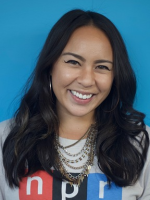Life is filled with big decisions. Should you move across the country? Start a business? Have a baby? Break up?
If you're not sure what to do, Nell Wulfhart has some counterintuitive advice. Don't keep deliberating. In fact, spend less time thinking about it.
In her over 10 years as a decision coach, Wulfhart has helped more than 600 people, from CEOs to artists, make difficult choices. She says nearly all her clients are able to find clarity within an hour of working together.
In her experience, "most people take way too long to make decisions. They get mired down in the analysis," she says.
That's partly due to a fear of regret, Wulfhart says. "Everyone is trying so hard to avoid that uncomfortable feeling." But part of getting unstuck is accepting that some regret is inevitable.
If you're struggling with indecision, Wulfhart offers exercises and advice to help you make faster choices with more confidence. This interview has been edited for length and clarity.
How do you make good decisions quickly?
There are two exercises I give every client.
First, make a list of your values. Not moral or corporate values, but the things that make your life good on a daily basis. Mine include: never setting an alarm clock, being able to wear sweatpants all the time, being in warm weather. Put them in order of importance.
Then when you're making a decision, go down the list and see which one of your options checks more boxes on that list of values.
The second exercise is to sketch out your ideal life in one year's, five years' and 10 years' time. Once you have written down what you'd like your life to look like, take the options you're deciding between and see whether you can draw a straight line from that option to the life you want.
Can you share an example of these exercises in practice?
I had a client who had a job offer that was better paid and more prestigious. On paper, that seemed like an easy decision: Take the job.
But in five years, she wanted to have a thriving business of her own, a business that was so successful she could take time off to spend with her kids.
We decided she should stay in her current job, save money and start working very hard at building her own business, so that in five years she could actually have the thing she wanted.
Can you speak to the role of regret when it comes to making decisions?
The decision-making business is really just the regret-minimization business. And because my big thing is about getting people to make decisions faster, we just have to accept that yes, occasionally, we will regret our choice.
We can eliminate a lot of regret by just moving faster. Many more people regret taking too long to make a decision than making a decision too quickly.
If you spend a year trying to figure out if you should go to grad school or three years deciding if you should get engaged, I've found that people regret the time they have lost deciding so much more than the occasional decision they made too hastily.
What are some other ways we can minimize regret in decision-making?
People who feel less regret are people who are able to say, "I made the best decision I could with the information I had at the time, and this outcome — I couldn't know it in advance."
We are just taking our best possible guess at the time with the information we have. Sometimes that thing is not gonna work out. It turns out your new boss is a micromanager or your new apartment has rats.
Those things were impossible to know when you were making the decision. The outcome is mostly outside our control. The decision is entirely within our control.
You also talk about testing things out.
The way we make good decisions is not by sitting at home and wondering if we're going to like something. It is by trying the thing out. Then we have actual, tangible data that tells us whether or not we like something.
I coached somebody once who was thinking about becoming a social worker. I told them, before you commit tens of thousands of dollars and two years of your life to getting this master's in social work, why don't you spend a few days shadowing someone who is a social worker?
You say that asking too many people for their advice can actually make it tougher to make a choice. Why is that?
By the time someone comes to me, sometimes they've talked to 10 or 20 different people. It just really muddies the waters. They're not helping you make the decision.
When making a big decision, talk to three to five people and that's it. Think about your past history with everyone and ask yourself: Does this person support me and give good advice?
If you know you are talking to somebody whose values are different from yours, who doesn't respect the way you live your life, or who always has negative things to say about your choices, do not talk to them. Make the decision and then tell them that's what you've decided to do.
Why do some people double down on decisions they know might be bad for them, but feel like they should stick to?
People think all the time about sunk costs: the time they've put into something, the money they've invested, the years of building the relationship. They spend almost no time thinking about the opportunity costs. They might be missing out on job opportunities or relationship opportunities by staying in a situation that's not what they want.
Even just trying to get to the thing you actually want is usually more rewarding. But people are very attached to their sunk costs. It can be hard to convince them to leave those behind.
This story was edited by Malaka Gharib. The visual editor is Beck Harlan. We'd love to hear from you. Leave us a voicemail at 202-216-9823, or email us at LifeKit@npr.org.
Listen to Life Kit on Apple Podcasts and Spotify, and sign up for our newsletter. Follow us on Instagram: @nprlifekit.
Copyright 2025 NPR




